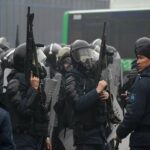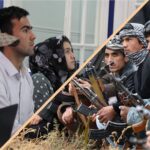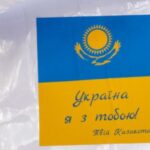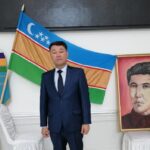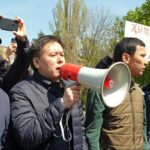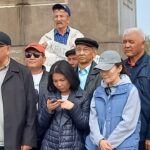This day 20 years ago, in summer of
Looking back and recalling difficult but interesting time of the 90s, we take pride and astonishment that there was no interest other than protecting the principles of law and general human values, including human rights. Having stated that, one should not assume that Bureau’s founders were naïve or quixotic idealists who were going to fight windmills. Establishment of the Bureau as a human rights organization was necessitated by the vital need and a democratic vector which dominated society of
Out of all pioneers who established the Bureau only few are presently with us. Life is life: people die, leave for other organizations, new people replace them. However, there is one common interest shared by those who set up the Bureau and those who joined the Bureau later: they are certain that their job of promoting human rights is important and honorable. Realizing that your job is to protect the law and rule of law, to protect people from humiliation, outrage and violence is the “warming feeling” for each of those who has devoted one’s self to protecting human rights despite little pay and continuous conflicts with the authorities.
Twenty years – is it too much or too little? From historical standpoint it is very little, but it is a lot considering that Bureau is only two years younger than our state. It is a little to speak about real achievements in establishing a system of juridical protection of citizens, but sufficient to declare that it has transformed into a profession. To-date, thanks to the efforts of our organization largely we can state that “protecting human rights is a profession”.
This profession has its specific features: it takes commitment to principles, determined by the human rights convention and a belief that protecting human rights is not just an occupation but an inner urge based on zero tolerance to injustice. However, these types of activities are neither a profession, nor an occupation or a job. It is an ideology, life philosophy; it is a “coordinates system” based on respect for human dignity, recognition of freedom as ultimate value and can absolute rejection of injustice.
Today, when looking back at the journey we made, we feel proud and satisfied that we have never betrayed any of our principles, never abandoned our believes. This is one of the most outstanding achievements of our team of which we are genuinely proud.
We never claimed and do not claim to be the world’s foremost authority, nor do we claim the monopoly in human rights, but we maintain our principled stand on two aspects which we have been defending and will continue defending. The first is the recognition of international human rights standards as universal benchmarks to be used in assessing relations between the individual and the state. Second is a belief that that rights and freedoms of
We realistically assess the opportunities for our work under present circumstances with serious restrictions and heavy regulation of civil rights and political freedoms, harassment of opposition, suppression of independent media. The Bureau marks its twentieth anniversary in a very difficult situation when opportunities for human rights activists to affect the situation are reduced to zero. Regrettably the authorities do not listen to us or do not respond to our requests, proposals and demands. However, there were certain achievements to be noted. Those were moratorium on execution of death penalty, cancellation of exit visas, progress of prison reform (when it was transferred to the Justice Ministry) and humanization of criminal policy in general. Ratification of international human rights treaties along with other initiatives can also be seen as a progress. The situation has changed substantially nowadays.
Even despite such unfavorable conditions we aspire to achieve our mission. Difficulties and problems at work, unwillingness of the authorities to react to criticism and accept the proposals do not justify despondency and giving up. Under present hard circumstances it is important as never before to maintain a full-fledged organization and to demonstrate commitment to principles and chosen ideals.
The monitoring of respect for political rights and civil freedoms in
The Bureau, within the framework of the Coalition of NGOs Against Torture continues making extensive efforts to prevent torture in detention facilities of law enforcement agencies.
We have been implementing projects focused on raising awareness, educating and informing general public about protection of their rights. That job was done through numbers organized schools, seminars, roundtable for law enforcement agencies and ordinary citizens, meetings at schools and universities. The Bureau’s web-site with exhaustive information on both the activities of the Bureau as well as general human rights situation in
We will proceed with our work of providing analysis and comments with regard to various legal acts with respect to human rights issues. Regardless of the fact that our proposals and recommendations are ignored by the authorities in majority of cases, we keep on knocking on those doors partly-closed for human rights activists. Regrettably, the examples of constructive cooperation with the authorities are in the past mainly and today we can only state that there is no mutual understanding between human rights activists and the authorities regarding evolution of legislation and enforcement practice.
We often hear words of reproach that Bureau does not support everyone seeking help in solving some private matters. Actually, there is some truth in that. There were times when Bureau had a public reception where people could address their requests. The practice has, however, revealed that working in a format of a law firm has virtually paralyzed the organization and affected achievement of its main mission of promoting and protecting fundamental civil rights and political freedoms.
From the very beginning the main vector of our activity was respect for political rights and civil freedoms. Those were, first of all, freedom of speech, freedom of expression, freedom to receive and disseminate information, freedom of conscience, freedom of association and peaceful assembly, right to freedom of movement, right to fair trial, and most importantly right to take part in governing the country, right to responsible and accountable power. All of the above mentioned are crucial conditions for unlimited enjoyment of other rights: economic, social and cultural. We are convinced that respect for the mentioned above political and civil rights is a safeguard of a civilized engagement between the citizens and the state and should therefore lead to discontinuation of systemic human rights violations. This is exactly why the Bureau was emphasizing in its activities the promotion, protection and respect for fundamental political and civil rights of our citizens. We are believe in this and we have been making a stand for this for all these years.
We continue making public statements announcing our discord with the actions of the authorities to limit and restrict human rights and freedoms. Criticism often results in irritation and negative reaction. That reaction shows in various attacks on the Bureau delivered by pro-governmental media, accusations of espionage, biased inspections of the prosecution offices, political motivated trail over Sergey Duvanov and unjust prosecution of the Bureau’s leader Yevgeny Zhovtis, who was unlawfully convicted and isolated for 2,5 years in settlement colony. All of the abovementioned create obstructions but the work continues anyway despite everything, and Yevgeni Zhovtis, for instance, has upon release continued his human rights activities and criticized the authorities for human rights violations and proved inconsistency of human rights policy in the state.
We have experienced a lot during the last twenty years. Our office was set on fire. We were robbed. There were attempts to threaten us. We were called “foreign spies” and “public enemy” or “enemy of the people”. Some media bullied us calling us “the fifth column”. Tax authorities attempted to close us down.
If we take these hardships the Bureau had as formal acknowledgement of our work by the state, we should be proud of ourselves, for such practice is normal for human rights organizations working in restricted conditions. However, we are even more proud for the appreciation demonstrated by international community.
The activities of KIBHR&RL is recognized internationally which is proven by awards to Director Yevgeny Zhovtis and its staff, namely USA and European Union Democracy and Civil Society Award in 1998, 1999 International League for Human Rights Award, 2004 European Union Human Rights Prize, 2005 International Helsinki Federation Recognition Award, 2007 Friedrich Ebert Stiftung Human Rights Award (Germany), 2010 Andrey Sakharov Award of Norwegian Helsinki Committee, the Ombudsman’s of Poland Medal For Merits for Human Rights Protection in 2013.
Yes, our subsistence is paid for by foreign foundations, international and foreign organizations. The reason for that is trivial: no one in the motherland wishes to donate for human rights activities. However, it does not mean that grantors dictate us what to do. Those who suggest that palter with truth. We ourselves know what to do and we in doing that we rely on international principles and standards of human rights. The scheme is simple and transparent. In that context our donors are not clients but partners who, just like us, are interested in the rule of law and respect for human rights in
Therefore, on the twentieth anniversary of the Bureau we cannot but commemorate our partners. We thank them for the support they rendered to us and through us to promotion of democratic principles in
Our partners are Organization for Security and Cooperation in Europe (OSCE), United Nations Organization (Office of UN High Commissioner for Refugees and Office of High Commissioner for Human Rights), Delegation of the European Commission and other bodies of the European Union. These are governments and diplomatic missions of
During all these years the Bureau had both ups when it had branches in practically every region of the country and downs when we had to close five branches. People would come and leave, some stayed with us, some left. Death took its toll on us too. Anniversary is a good cause to recall and pay tribute to those who passed away: Alexander Zhovtis, Tatyana Silkina, Nurbolat Massanov; Yermek Bekeshov from Astana; Dulat Tulegenov and Andrey Klimonov from Aktobe; Doskali Tasanov from Atyrau; Alexey Pugayev, Alexander Skryl, Mariya Pulman from Almaty – they were our comrades and this anniversary is theirs too.
We would like to express special gratitude to those who worked at the Bureau but left for various reasons (in ascending order): Murat Aidosov, A.Azhikhanova, Inara Aldybayeva, Sandugash Aliakbarova, Daniyar Alibekov, Tatiyana Angald, Eduard Arutunyan, Pavel Afanasyev, Andrey Bayev, Azamat Baizhanov, Tatiyana Beloglazova, Dana Belgeubayeva, Kazbek Bunguyev, Gulnar Valiyeva, Oleg Voropayev, Maxim Geta, Yevgeniya Glebova, Rezeda Gluschenko, Natalya Golovina, Nurken Gubashev, Marat Davesov, Kanat Dzhiyenbayev, Olga Didenko, Alexander Dykyn, Galina Dyrdina, Ainur Yelibayeva, Raushan Yesembayeva, Alfiya Zaitova, Abdutalip Ibraimov, Yelena Ignatenko, Malik Issabekov, Doka Isakiyev, Tokzhan Kizatova, Vyacheslav and Maya Kim, Dmitry Kireichev, Yelena Kostenko, Bagila Kuatova, Meruert Kubeyeva, Lyazzat Kydyrova, Vladimir Lunev, Valery Lyubushin, Aliya Massanova, Adam Merzhoyev, Rinat Muzafarov, Toleu Mukanov, B.Mukhamedyanova, Nurzhan Nauryzbayev, Pavel Nosov, Aliya Nurusheva, Aigul Omarova, Svetlana Oryspayeva, Elena Ostanina, Yuliya Ostrikova, Alexey Otroshko, Vitaly Petrenko, Natalya Pobegai, Leila Ramazanova, Vitaly Semushkin, Yuliya Stepanova, Yulia Tatrinova, Alexander Timoshenko, Alexamder Tishakov, Eleonora Tleu, Gulzira Tulegenova, Zhemis Turmagambetova, Viktoriya Tyuleneva, K.Uzykanova, Ulboldyn Utemisova, Mikhail Frolov, Berik Khabitov, Dmitry Khalidov, Marat Khassanov, Zhanna Chalabayeva, Nailya Chiukina, Nurgul Shakizade, Askhat Shakirov, Amangeldy and Aina Shormanbaev’s, Maxim Yugai.
We also extend our gratitude to large group of volunteers of the Bureau in Almaty, Astana and in the regions.
Presently, there are many new staff members of the Bureau, worthy successors of those who established the Human Rights Bureau 20 years ago. Simply listing their names would mean nothing and each of them deserves to be mentioned individually. They are members of today’s Bureau and that says it all, whereas personal information can be found on our web-site. However, there are some things which cannot be found on the web-site. In brief, all of them all are courageous and valorous people, who are not afraid of doing such a dangerous for
July 10, 2013



